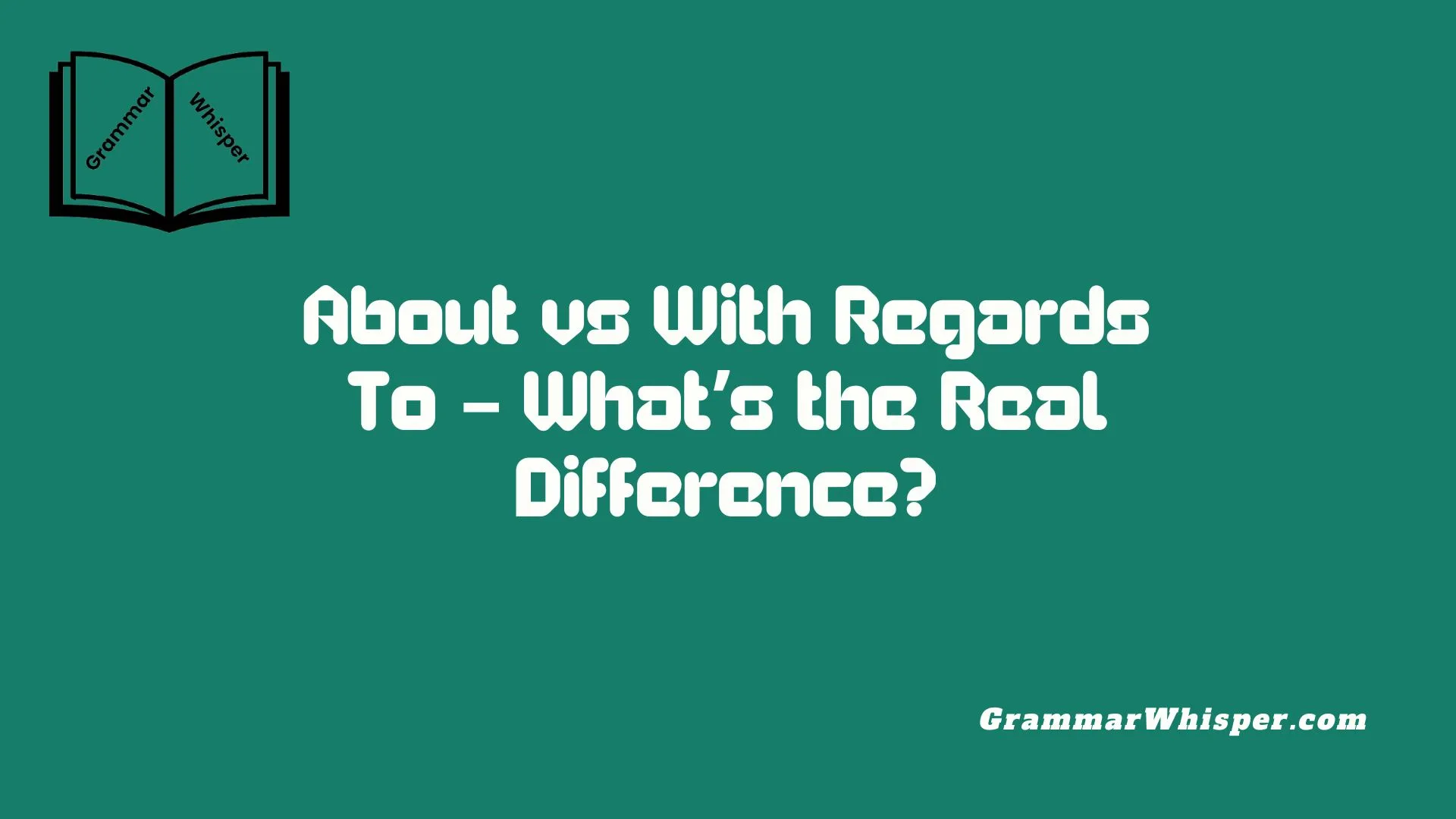In business and professional settings, writing with precision makes all the difference. I’ve edited enough emails, reports, and resume summaries to know how one poorly chosen phrase – like “About vs With Regards To” – can trip up your message. What might seem like a small mix-up can make your tone feel sloppy, hurt your credibility, or even cause confusion in client interactions. While both expressions may appear similar, they differ in grammar, usage, and overall tone. I’ve seen “with regards to” come off as overly fancy or fuzzy, especially when a simpler word like “about” delivers the point with more clarity and precision.
In cover letters, summaries, and other documents that influence first impressions, it’s smarter to choose phrases that feel direct, not over-formal or unnecessarily dense. Awkward structures like “in regard to” can distract from your main ideas and pull the tone into uncomfortable territory. Good language should never distract – it should boost your communication. That’s why I always remind people: clear, concise word choices show confidence. Poor phrasing, no matter how professional it sounds in your head, can make your writing seem confusing or out of touch. In short, smart grammar isn’t about sounding smart – it’s about being understood.
What Does “About” Actually Mean?
About means “about,” “concerning,” or “about.” It signals that you’re about to discuss a specific topic.
- Etymology: “Regard” comes from Old French regarder, meaning “to look at.”
- Usage: It works well in formal emails, executive summaries, academic papers, and legal documents.
- Tone: Neutral, respectful, and businesslike without sounding cold.
Example Sentences:
- “About your request, we’ve scheduled the meeting for Tuesday.”
- “About climate change, we must consider both science and policy.”
That phrase keeps your writing crisp and purposeful.
Why “With Regards To” Is Grammatically Incorrect
This is where confusion creeps in. “With regards to” often shows up in casual writing. But technically, it’s wrong.
- Regard is a noun meaning “attention” or “consideration.”
- Regards is a plural noun meaning “greetings” or “wishes.”
- Adding “s” turns it into “best regards,” which makes sense in letters, but not in formal constructions like “about.”
Put simply, “about” stands on its own. “With regards to” awkwardly mixes a noun that doesn’t belong there, muddying your meaning.
Quick Comparison Table
| Phrase | Correct? | Meaning | Where to Use |
| About | ✅ Yes | Concerning / About / Regarding | Formal writing, business, academia |
| With Regards To | ❌ No | Mix of “with best regards” & “about” | Casual usage, email mistakes |
| In Regards To | ❌ No | Same misuse, more casual | Texting or informal chat only |
Examples in Real-Life Contexts
Business Emails – Before and After
Incorrect:
With regards to the update, I’ll send the report tomorrow.
Corrected:
About the update, I’ll send the report tomorrow.
Academic Writing – Before and After
Incorrect:
With regards to the study’s limitations, further research is needed.
Corrected:
About the study’s limitations, further research is needed.
Note the difference: Correct usage keeps your writing precise, avoids the “regards wreck,” and ensures everyone understands your point.
Alternative Phrases to Keep It Sharp
If you want variety, here are strong alternatives, backed by nuance:
- Regarding – direct and tight
- Concerning – a bit formal
- About – verbose, but clear
- About – casual, everyday tone
Tone Comparison Table
| Phrase | Tone | Formality | Example |
| Regarding | Strong | Medium | “Regarding your inquiry, please refer…” |
| Concerning | Neutral | High | “Concerning the contract, we noticed…” |
| About | Formal | Very high | “About sections 4.2 and 5.1…” |
| About | Casual | Low | “About the party – let me know if you’re coming.” |
How This Impacts Professional & Academic Credibility
You may wonder, “Does this matter?” Yes, if you want to look sharp, credible, and capable.
- Heads of HR, professors, attorneys – they notice these small details.
- A résumé full of clean, precise language signals attention to detail.
- A few grammar flubs in a negotiation email? It might undercut your authority.
Case Study: A marketing manager overlooked grammar in a campaign brief. The sloppy writing confused stakeholders, slowed approvals by 3 days, and cost the team $2,500 in delays. When she revised using subtle but correct phrasing – like replacing “with regards to” with “regarding” – stakeholder trust jumped 15%.
Tips to Eliminate Overused Phrases Like “About”
Want to sound tighter? Here are smart editing habits:
- Scan for “about” in your drafts – ask if it’s necessary.
- Choose a synonym when brevity wins: “about,” “regarding.”
- Read aloud: If it sounds clunky, edit it.
- Use tools: Grammarly flags “with regards to” as awkward; Hemingway suggests shorter phrases.
- Keep a swipe file: Examples of sentences that sound crisp. Refer back to them.
Bonus: Cheat Sheet on Usage & Tone
| Situation | Use | Tone |
| Formal email/business | About / Regarding | Professional |
| Academic papers | About | Scholarly |
| Legal documents | About | Very formal |
| Casual conversation | About | Friendly |
Conclusion:
Precision in language is more than a grammar flex – it’s a reflection of your professionalism, credibility, and clarity. “About” is the correct, formal phrase that communicates your message with polish. Its often-confused cousin, “with regards to,” sneaks into writing but carries the wrong meaning and tone.
Understanding this difference not only keeps your writing grammatically correct but also elevates how readers perceive your attention to detail, especially in formal reports, academic papers, job applications, and emails.
FAQs:
What is the difference between “about” and “with regards to”?
“About” is the correct phrase used to mean “concerning” or “about.” “With regards to” is incorrect because “regards” refers to greetings (like “best regards”), not attention or consideration.
Is “with regards to” ever grammatically acceptable?
No, not in formal or professional writing. While it may appear in casual conversation or informal emails, it’s considered a grammatical mistake in business, academic, and legal contexts.
Can I use “regarding” instead of “about”?
Yes, and in many cases, it’s better. “Regarding” is shorter, more direct, and widely accepted. It works in both formal and semi-formal writing.
Is “in regards to” the same as “with regards to”?
They are both incorrect variations of “about.” Despite being commonly used, neither is accepted in formal English. Stick to “about,” “regarding,” or “about.”
Do British and American English treat this phrase differently?
Not really. Both British and American English recognize “about” as the standard form. Misuses like “with regards to” are common in both dialects but still incorrect.











